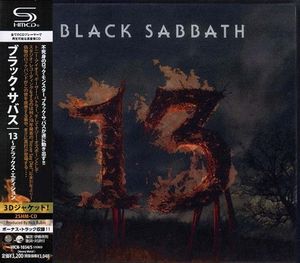 The iconic Black Sabbath, often credited as the godfathers of heavy metal, released *13* in 2013 as what was supposed to be a triumphant farewell. With expectations riding high, fans anticipated a fitting conclusion from the pioneers of the genre. However, what was meant to be a powerful swan song ended up leaving many underwhelmed. Though the album debuted at number one in multiple countries and marked the band’s first chart-topping release in the U.S. in decades, the reception was mixed among fans and critics alike.
The iconic Black Sabbath, often credited as the godfathers of heavy metal, released *13* in 2013 as what was supposed to be a triumphant farewell. With expectations riding high, fans anticipated a fitting conclusion from the pioneers of the genre. However, what was meant to be a powerful swan song ended up leaving many underwhelmed. Though the album debuted at number one in multiple countries and marked the band’s first chart-topping release in the U.S. in decades, the reception was mixed among fans and critics alike.
Produced by Rick Rubin, a heavyweight in the music industry, *13* features founding members Ozzy Osbourne, Tony Iommi, and Geezer Butler, with Rage Against the Machine’s Brad Wilk filling in on drums in the absence of original drummer Bill Ward. The band aimed to recapture the dark, doomy essence of their 1970s sound. But despite the promising lineup and nostalgic approach, the album feels more like a shadow of their former glory rather than a bold final statement.
The album opens with “End of the Beginning,” a track that aims to invoke the same eerie, crawling atmosphere as the band’s early work. However, instead of building tension, it feels labored, lacking the spontaneity and raw energy that made their classics so engaging. Tracks like “God Is Dead?” attempt to combine philosophical musings with doomy riffs, but the message feels heavy-handed and outdated. The song’s nearly nine-minute length, while intended to be epic, drags unnecessarily and lacks the dynamics needed to keep listeners fully engaged.
While Tony Iommi’s signature riffing is still impressive, much of it comes off as repetitive, as if the band is recycling ideas from their past albums. Geezer Butler’s bass lines are solid but fail to stand out or surprise, and Osbourne’s vocals—though serviceable—lack the menace and unhinged character that defined his earlier performances. The absence of Ward’s drumming is palpable, with Wilk’s competent but uninspired playing never quite matching the quirky, jazzy flair that Ward brought to the table in the band’s heyday.
The production by Rick Rubin is another point of contention. While Rubin sought to distill the essence of Black Sabbath’s early sound, the result feels forced. The album has a polished yet lifeless sheen, lacking the raw grit that gave their early recordings such emotional weight. Tracks like “Zeitgeist” are meant to serve as callbacks to classics like “Planet Caravan,” but instead, they come off as pale imitations, evoking nostalgia without adding anything new or meaningful.
Though *13* is not without its moments—“Loner” offers some catchy hooks, and “Damaged Soul” delivers a bluesy vibe—it falls short of the monumental impact fans hoped for. Rather than ending their career with a definitive, genre-defining record, Black Sabbath’s farewell feels more like a retread of old territory.
Ultimately, *13* is not a disaster, but it is a missed opportunity. It offers glimpses of the band’s former brilliance but never quite lives up to the legacy they created. For a band that revolutionized metal and inspired countless musicians, *13* feels like an anticlimactic ending. Black Sabbath deserved a grand finale—something bold, daring, and reflective of their immense influence. Instead, they leave us with an album that, while competent, is far from the monumental send-off fans hoped for.
